

|
Design is closely affiliated with the experimental, which is as an exploratory and probing undertaking. What does this mean in the context of design research? Today, design research relies on various and divergent notions of design experimentation and ideas about their value and uses. In one corner, experimentation is conceived of as designerly exploration into, for instance, materials, technologies, and expressions. In another corner, design experimentation is shaped according to hypothetical-deductive models of knowledge production inherited from science and engineering. Yet, in a third corner, design experiments are explored as a means for promoting social change or as a critique of political and ethical values. For instance, this can take the form of critique through fiction and utopias.

· Objects of design experiments
· Experimental expressions
· Design experiments as critique
· Experiments in design research versus in science and art
· Methods of experiments in design research
· Staging experiments
· Places of design experiments
· Experiments in design education
· Submission deadline: January 10th, 2013
· Author notification: March 20th, 2013
· Submission of final version: April 20th, 2013
The Nordes 2013 conference invites original papers on various forms of experimentation within design and design research. Full papers must be of the highest international standard and contribute significantly to research and practice within design. Nordes 2013 aims to be a multidisciplinary forum for emergent and current research areas influencing the various design disciplines. Full papers should be 10 pages including illustrations, figures, and references. Papers will undergo double blind peer-reviews and accepted papers will be presented in the conference programme and published in the conference proceedings. The proceedings will be available as an open access online database during and after the conference.
We invite the submission of exploratory papers that include design cases, position papers, work in progress, and emerging new research areas which may yet lack solid theoretical foundations, but point towards exciting new directions for design research. Exploratory papers should be 4 pages, including illustrations and references. Exploratory papers will undergo double blind peer-reviews and accepted papers will be published in the conference proceedings. The proceedings will be made available as an open access online database during and after the conference.
To facilitate the double blind review process, authors should make an effort to ensure that their identity is not revealed by information contained in the submission. For example, please replace references to the author’s proper name by the term “Author,” including any bibliographic data.

Workshops at Nordes 2013 will enjoy a central position. The ambition is to create common experiences and to provide different kinds of platforms for exchanging new ideas. A day in the middle of the program will be reserved for workshops and all conference participants are expected to take part in at least one workshop. We especially invite proposals where the format encourages active participation by the workshop attendees or which demonstrates new ways of how experiments can be explored in a workshop setting. A workshop can, for instance, take the form of on-site enactments, excursions, tutorials, studios, discussion sessions, etc.
A workshop proposal should be maximum 2-3 pages and state its purpose, a tentative programme for the day (or half a day), how attendees are accepted for participating in the workshop (e.g. through artifacts or position papers, or just by signing up), requirements for to physical setting (see Venue) and materials (see Practical issues)
· Submission deadline: January 10th, 2013
· Workshop notification: March 20th, 2013
· Submission of final proposal: April 20th, 2013
The workshop venue in Malmö will be at STPLN. It is located in an industrial building, recently renovated, in the old harbour area, which is going through a massive conversion towards becoming a residential and office neighbourhood. The building is run by a NGO (STPLN) as a facility for diverse activities, from concerts to building robots, from office work to skate-rollers training. The space can be looked upon as a platform for opening production, since it is giving individuals and small organizations the possibility to engage in production processes and prototype ways of generating goods and providing services by sharing facilities and collaborating.
The space has two floors; on the basement there is Fabriken, the actual workshop, with some fabrication machines, hand tools and equipment to work with electronics. Fabriken is also hosting other initiatives: a bicycle repair workshop (Cykelköket), a textile corner (Tantverket) and a material bank of cast-off materials (Återskapa), which organizes activities for children and adults to foster creativity and environmental awareness. At the ground floor there is a venue for concerts, a quite big kitchen and another big room that during working days hosts a co-working facility (HUBn).
Workshop organizers must be prepared to bring all necessary material for the workshop. The review process will include negotiations about requirements for the physical setting and materials.
· Sarah Ilsted Hjelm (KTH Royal Institute of Technology, sarai [at] md.kth.se)
· Anne Louise Bang (Kolding School of Design, alb [at] dskd.dk)

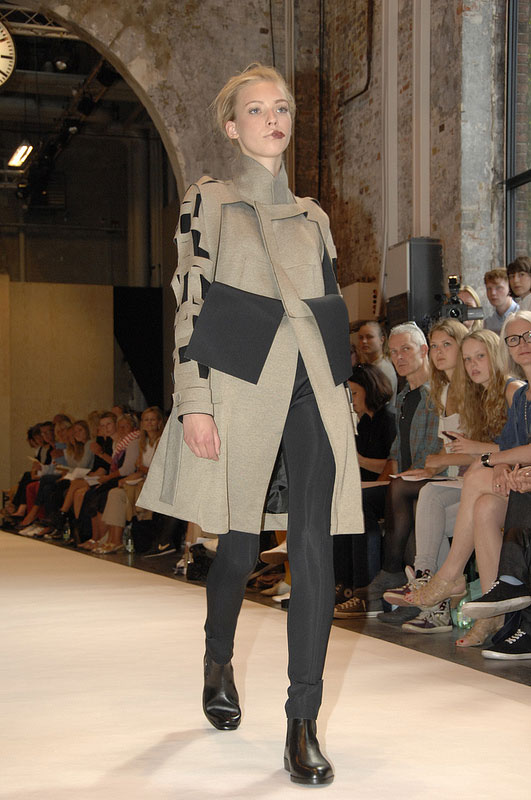
Submissions for the exhibitions can take on three forms:
A) For the exhibition alone.
The submission must be documented as a visual material, such as photographs or video (digital formats only, max 10M in total). The submission should be accompanied by a brief description (80 words max) of the creative work as well as a two-page paper explaining the main idea of the work and how it is related to the conference theme. (This proposal should be submitted through the exhibition category in the submission system)
B) & C) As accompanying a full or exploratory paper (10 or 4 pages).
The submission should then include a visual material, such as photographs or video (digital formats only, max 10M in total) as well as a brief description (80 words max) of the creative work documenting the contribution for the exhibition. The submission will be reviewed as a whole. (This proposal should be submitted through the full/exploratory paper category in the submission system)

The artists/designers/researchers are responsible for all shipping costs to/from the Royal Danish School of Design, Copenhagen. We recommend the artists/designers to take out an insurance on their works during the transport and display. All selected works should arrive at the Royal Danish School of Design in Copenhagen by 1st of June, 2013. The exhibition will close after the conference and exhibition pieces should be collected from the space by 12th of June 18.00 CET.
To facilitate the double blind review process, authors should make an effort to ensure that their identity is not revealed by information contained in the submission. For example, please replace references to the author’s proper name by the term “Author,” including any bibliographic data.
· Li Jönsson (The Royal Danish School of Design, ljo [at] kadk.dk)
· Maarit Makela (Aalto University, School of Design, maarit.makela [at] taik.fi)
· Flemming Tvede Hansen (The Royal Danish School of Design, fth [at] dkds.dk)


The intention is that the workshops enable designers and design researchers to explore and discuss the many aspects of design research in an experimental and “designerly” way!
Workshops at Nordes 2013 enjoy a central position, since Tuesday (June 11th) is reserved for workshops at STPLN in Malmö (see “venue” for further information). The ambition is to create common experiences and to provide different kinds of platforms for exchanging new ideas. The Nordes workshops take many forms and contribute to various fields within design research, among them Co-design, Critical Design, Sustainable Design, Health/Ageing, Design Thinking and Experimental Sketching.
All conference participants are expected to take part in a workshop. Please go through the list of workshops, which you find below. Each title/abstract are linked to a 2-3 pages description of the workshop. See details for how to register for a workshop in the pdf. If nothing mentioned you register by e-mailing the first author.
See you at Nordes 2013!
· Sarah Ilsted Hjelm (KTH Royal Institute of Technology, sarai [at] md.kth.se)
· Anne Louise Bang (Kolding School of Design, alb [at] dskd.dk)
List of Workshops in alphabetical order:
Yanki C Lee, Sara Hyltén-Cavallius & Virginia Tassinari
Full day – 9.30-16.30, The Theater
Registration: Yanki Lee: yankilee(a)hotmail.com
Abstract: This collective design workshop aims to provoke and test new design approaches towards ageing. We are looking for design stories/narratives that show how design thinking and collaborative working can enable the world to respond differently to the challenges of ageing. Can designers change our inherent ageism through the engagement of older people in the design and delivery of services and products with them? Can we change our current strategies towards ageing, turning its potential challenges into opportunities to engage, empower and improve the lives of the elderly? Together, we aims to build a collective design approach with ingenious older people and for our future selves.
Mette Agger Eriksen, Maria Hellström Reimer, Eva Brandt & Kirsikka Vaajakallio
Full day – 9.30-16.30, Återskaper Front Room
Registration: Mette Agger Eriksen: mette.agger(a)mah.se
Abstract: How do various design games format and stage different collaborative inquiry, learning and reflection? At this hands-on workshop, we will collaboratively explore, relate and meta-reflect upon how different design (and learning) games can form part of experimental, co-design (research) processes and practice. Some shared playing of mainly analogue games brought by the workshop organizers and participants will provide the basis for engaging in a game-inspired experiment of collaboratively relating and reflecting upon qualities and controversies of different design games. This reflection experiment will be shaped around predefined and emerging topics.
Catherine Greene, Giota Alevizou, Gail Ramster, Katerina Alexiou, Theo Zamenopoulos, Alan Outten & Cristina Gorzanelli
Half day – 9.30-12.30, The Dormitory
Registration: Gail Ramster: gail.ramster(a)network.rca.ac.uk
Abstract: Asset mapping, a method for unearthing and visually representing an individual’s or a community's assets, has been used in the context of planning and creative industries.
The goal of this workshop is to bring together stakeholders from diverse backgrounds and practices to discuss and generate outcomes that make use of different perspectives of asset mapping methodologies.
At the core of activities, facilitators will demonstrate the ways in which asset mapping has been used with community groups within an area or neighbourhood in the Creative Citizens research project - a project which explores how different types of creativity and civic engagement intersect to add value to communities in the context of a radically changing media landscape.
Andrea Augsten & Frederike Beha
Half day – 13.30-16.30, The Dormitory
Registration: Frederike Beha: fbeha(a)be-id.de
Abstract: Current global challenges need a new way to look at how we design products, services and solutions. One the one hand these global trends influence innovation but on the other hand the user and his individual needs have to be taken into account. This leads to the task of reframing requirements based on empathy, multidisciplinary teams and a learning culture in order to design sustainable products that create values for the users. Participants in this workshop will be guided through a process of designing a new product or service. Special focus will be placed on the experience of how to create empathy for the user as well as for different trends, opinions and ideas. This includes the experience of learning from mistakes and lays claim to challenging and iterating ideas. This workshop combines elements from Design Thinking, Change Management, Lean Startup and Leadership principles.
Vanessa Carpenter & Mikkel Leth Olsen
Full day – 9.30-16.30, Fabriken
Registration: Vanessa Carpenter: vjc(a)delta.dk
Abstract: Throughout the process of design research, synthesis is an important aspect for bringing together past and current knowledge to facilitate new ideas. In this workshop participants will be challenged to explicitly explore their ideas using IdemoBits. IdemoBits are a tangible tool to be used during the process of design research enabling the designer to explore ideas immediately using electronic materials. This is a very hands-on, active workshop where attendees are expected to participate, contribute, and play; exploring the IdemoBits as tools, and reflecting on the process of synthesis, in order to contribute to a model of ideation.
Johan Pedersen & Vanessa Carpenter
Half day – 13.30-16.30, Fabriken
Registration: Vanessa Carpenter: vjc(a)delta.dk
Abstract: Today design research explores many new ways of interaction, which often requires energy-consuming technology. This limits the design space available and the purpose of this workshop is to open that space and make interaction possible in new scenarios with the possibilities of energy harvesting used as a tool to design in a new field of automated sustainable devices. Energy harvesting can make seamless and almost invisible interaction design possible.
Judith Marlen Dobler
Half day – 9.30-12.30, Back Stage
Registration: Judith Dobler: info(a)judithdobler.de
Abstract: What impact does the act of sketching have on thought processes? How may knowledge through sketching be reflected and lead to new epistemic insights? The workshop addresses these theoretical and methodological questions on the basis of specific drawing experiments. During the workshop the experimental use of sketches as a reflective tool in thinking and design processes is introduced. Experimental sketching is a participatory investigation about how knowledge is gained by drawing and how this process can be methodically, theoretically and practically reflected.
Laurene Vaughan, Aislilng Keliher & Andrew Morrison
Full Day – 9.30-16.30, The Meeting Room
Registration: Laurence Vaughan: laurene.vaughan(a)rmit.edu.au
Abstract: The field of design research is in a rapid stage of its evolution. As it does so, the methods for undertaking research, and the contexts that these occur in are also evolving. Situated in the space between critical design and design fiction, participants in this workshop will explore new ways for experimenting within design research. The facilitators of the workshop come from three different aspects of design research, three markedly different locations and yet intersect in their interest in exploring and manifesting, new iterations of design research in practice. In this workshop, participants will explore methods for undertaking design experiments, methods as experiments, or experimenting with methods.
Bo Westerlund & Anna Rylander
Full day - 9.30-16.30, The Theater
Registration: Bosse Westerlund: bo.westerlund(a)konstfack.se
Abstract: This full day workshop intends to explore design experiments to create a deeper understanding of the underpinning mindsets, epistemological assumptions and their implications as well as possibilities within the context of academic research. The participants will contribute with their experiences of conducting design experiments in a variety of settings and contexts. During the workshop the participants will give and get feedback on the experiments presented and explored, and participate in the discussion and development of (new) principles for design experiments in academic research. One aim of the workshop is to develop a conceptual map that categorizes the various design experiments based on their epistemological assumptions and practical implications for design practice as well as academic research.
Laura Popplow
Half day – 9.30-13.30 (including lunch), Fabriken/The Rough Kitchen
Registration: Laura Popplow: l.popplow(a)gmx.de
Abstract: “FUNGUTOPIA is the design of a social and ecological utopia based on urban mushroom cultivation”. The Project FUNGUTOPIA is a design | research in process. The workshop will work with and about the material of fungal mycelium. We will learn how to cultivate oyster mushrooms with simple kitchen tools and let them grow in self-build forms. To understand how to work with the living material of fungi, we will discuss their properties and characteristics and the potential of mushrooms as building material, recyclers, food and medicine. Apart from the hands-on-approach the workshops goal is also to discuss questions about “design in process”: How is our understanding of design changing when we start thinking about lifecycles of creation, use and decay? How can we take the material serious as agency in the design process? How could we truly co-design with the “other” – be it human or non-human?
Christina Lundsgaard, Carolina Souza da Conceição & Johanna Eriksson
Full day – 9.30-16.30, The Theater
Registration: Christina Lundsgaard: clu(a)kadk.dk
Abstract: Are you interested in designing new ways of networking at the Nordes conference with fellow researchers? Do you want to explore and discuss the so called “workspacelab” as a platform for user involvement?
This workshop invites participants to explore a particular version of the design:lab called the workspace:lab. With a focus on methods like probekits, design games and experience prototyping the participants will experience what it is like being part of the design:lab as “users” and they will be exposed to the different equipment and tools used in the “laboratory of change”. Though the main focus of the workshop is to explore the workspace:lab, the actual output of the workshop is also relevant. The participants will be encouraged to codesign examples of new ways of networking at conferences, which could benefit the Nordes community in the future.
Hester Anderiesen & Laura Eggermont
Half day – 9.30-12.30, Återskaber Back Room
Registration: Hester Anderiesen: h.anderiesen(a)tudelft.nl
Abstract: This workshop aims to bridge the gap between game-, and product design and the theoretical knowledge of the field of neuropsychology. During the workshop we will design playful experiences to stimulate older persons with Alzheimer’s disease, in order to delay disease progression. Knowledge concerning the progressive course of neuropathology of the disease can substantially contribute to the design of suitable games, or playful products, for this user group. In view of the increasing population of older persons with Alzheimer’s disease, the design of relevant games or playful products by well-informed designers will benefit this group and is urgently needed.
Mike Thompson & Danielle Arets
Full day – 9.30-16.30, Kitchen/The Dining Room
Registration: Mike Thompson: info(a)thefatfactory.nl
Abstract: In 2005, the global adult biomass hit around 287 million metric tons, 15 million metric tonnes of which being caused by an overweight global population (a body mass of 25 or greater). As the worlds population continues to soar (the UN estimates the world population will reach 9.1 billion by 2050) there will be considerably more mouths to feed, and energy needed to sustain this rate of development. Paradoxically then, fat is both a waste of resources and a valuable resource in its own right.
The Fat Factory is a Critical Design Research project investigating the full, untapped potential of fat. Developing a critical approach to this topic, we investigate whether a research based, analytical design process can lead to truly innovative design solutions. What if we stop thinking of fat as abhorrent or waste? What if we learn to love fat?
Nordes 13 marks the official Kick-Off of The Fat Factory, starting with a preliminary exploration into an alternative approach to fat. In the workshop "Chewing The Fat", we invite participants to get hands-on with this most decisive of materials. Starting with the group preparation and eating of a high-fat lunch, inspired by the Inuit diet (a high protein, high-fat diet proven to increase cardiovascular health), participants will use this same material (and waste) to experiment in the production of Bacon Soap and Blubber (Fat) Lamps. Following these hands-on experiences with fat, participants will be invited [in groups] to explore the potential risks, challenges and opportunities in reaction to the theme "Fat As The New Oil", developing their own speculative scenarios and critical design concepts in response to the key topics and facts (including obesity, waste management, energy production, the meat industry, and the constitution of fat in extreme conditions), discussed throughout the day.


The Doctoral Consortium is a full day pre-conference session taking place on Sunday June 9, 9.00-16.30 at The Royal Danish Academy of Fine Arts, School of Design in Copenhagen. The research areas covered by the Doctoral Consortium are the same as the Nordes 2013 conference generally. To apply for participation please submit a 4 page paper (using the template), including a short resume (CV), by e-mail to the chairs of the consortium (see below) before March 10th 2013.
All accepted papers will be sent out to participating students. The consortium will be organised as a seminar discussion where each paper will be brielfy presented (10 minutes) by the author as introduction to a discussion (20 minutes) led by the chairs of the doctoral consortium.
· Lars Hallnäs (University of Borås, Lars.Hallnas [a] hb.se)
· Joachim Halse (The Royal Danish School of Design, jha [at] kadk.dk)

The School of Design (SD) at the Royal Danish Academy of Fine Arts is an educational institution under The Danish Ministry of Science, Innovation and Higher Education. SD educates designers and craft artists, and for more than 135 years, the school has been involved in developing Danish design and crafts with an international reach. SD is founded on the Nordic design tradition, where functionality and aesthetics go hand in hand with business sense, and today it is a modern, business-oriented design school where groundbreaking partnerships, ambitious visions and new technologies go hand in hand with creative artistic development and professional innovation. SD combines a strong tradition for creativity, design and quality craftsmanship with the postindustrial demand for flexible and research-based qualifications. In 2010 SD’s five-year design education was accredited and recognized as a university-level educational institution, providing bachelor’s and master’s degrees.

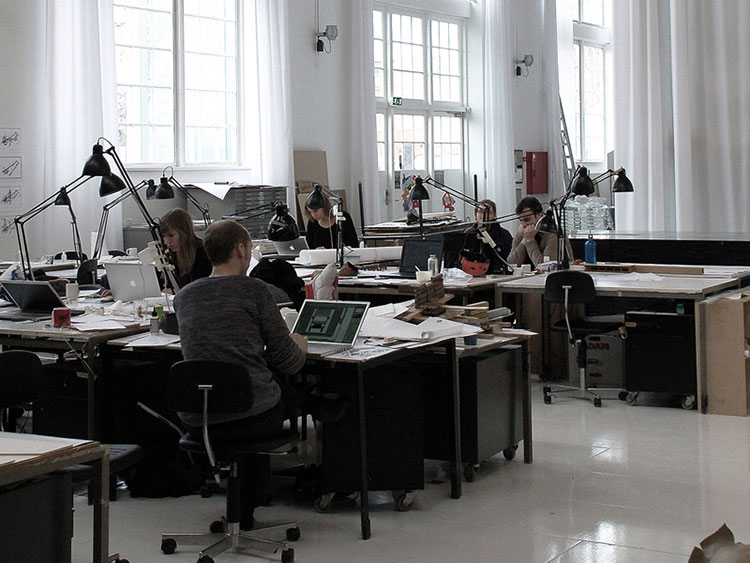
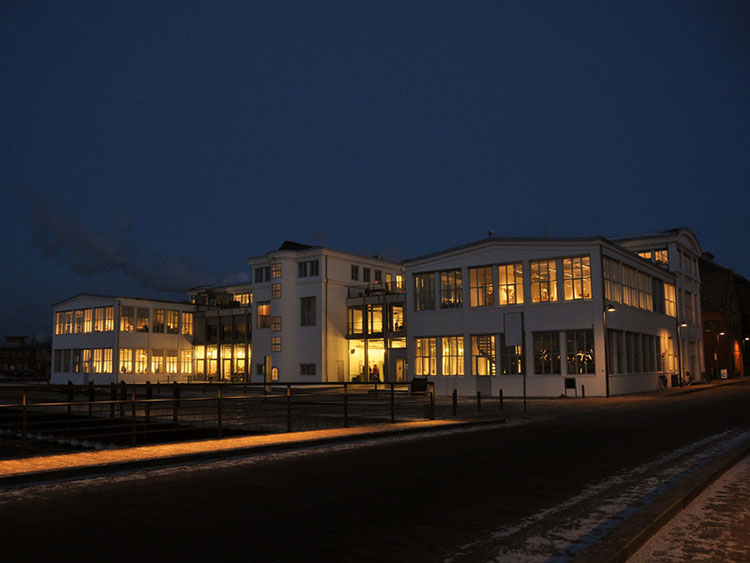
The workshop venue in Malmö will be at STPLN. It is located in the old slipway next to the skate park, once also used as Kockums workers dining- and dressing rooms. 3000 squaremeters of raw industrial building not re-entered since the mid seventies now function as exhibition hall, theater scene, concert arena, workshop or whatever people like to use it for. The mainpurpose with making these premises available is that people with ideas should have somewhere to express and develop these. Some features of
STPLN are the maker spaces Fabriken, Cyckelköket and Tantverket.
STPLN
Stapelbäddsgatan 3, Malmö, Sweden.



· Eva Brandt (The Royal Danish School of Design, eva.brandt [at] dkds.dk)
· Pelle Ehn (Malmö University, pelle.ehn [at] mah.se)
· Maria Hellström Reimer (Malmö University, maria.hellstrom.reimer [at] mah.se)
· Troels Degn Johansson (Kunstakademiets Designskole, tdj [at] kadk.dk)
· Thomas Markussen (Kolding School of Design, tm [at] dskd.dk)
· Anna Vallgårda (IT University of Copenhagen, akav [at] itu.dk)
· Li Jönsson(The Royal Danish School of Design, ljo [at] kadk.dk)
· Maarit Makela (Aalto University, School of Design, maarit.makela [at] taik.fi)
· Flemming Tvede Hansen (The Royal Danish School of Design, fth [at] dkds.dk)
· Sarah Ilsted Hjelm (KTH Royal Institute of Technology, sarai [at] md.kth.se)
· Anne Louise Bang (Kolding School of Design, alb [at] dskd.dk)
· Lars Hallnäs (University of Borås), Lars.Hallnas [a] hb.se)
· Joachim Halse (The Royal Danish School of Design, jha [at] kadk.dk)
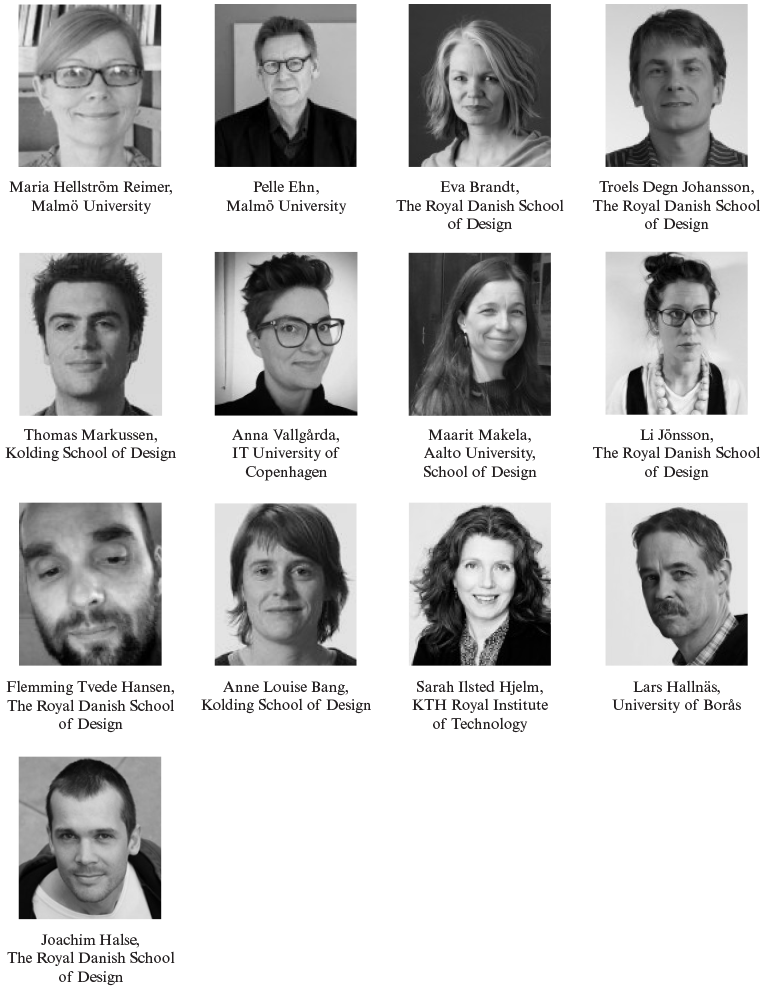

1. Fill out this google registration form:
2. Pay your total conference fee to The Royal Danish Academy of Fine Arts, School of Design:
Bank: Danske Bank
Reg. No.: 0216
Account: 4069022014
Swift: DABADKKK
IBAN: DK0902164069022014
Bank's address is:
Holmens Kanal 6-12
1260 København K,
Branch number is:
DABADKKKXXX
Remember to write your full name and affiliation + NORDES13 when transferring the money.
3. When we recieve both your payment and your form you will get an email confirming your registration to the Nordes 2013 conference.
· In order to have contributions included in the conference at least one author/organiser have to have registered and paid conference fee before May 5th 2013.
· If you register as student or PhD remember to send documentation to registration_Nordes13 [at] kadk.dk
· Early bird (before May 5th. 2013): 200 €
· Regular (after May 5th, 2013): 295 €
· On site: 350 €
· Extra person, conference dinner 50 €
· Early bird (before May 5th 2013): 430 €
· Regular (after May 5th, 2013): 510 €
· On site: 550 €
· Extra person, conference dinner: 50 €
Attendance in conference events, doctoral consortium, workshops, evening programs, conference lunches, conference dinner, and book of abstracts.
· Single room per night: 620 DKK
· Doble room per night: 780 DKK
· Breakfast included: Yes
· Reservation deadline: May 10th, 2013
Wakeup Copenhagen, Carsten Niebuhrs Gade 11, Copenhagen V
Reservation: Contact wakeupcopenhagen@arp-hansen.dk / +45 4480 0000
Please include the following information: Block ID: 1391088, the number of your credit card and date of expiry.
· Single room per night: 585 DKK
· Doble room per night: 585 DKK
· Dorm: 690-1700 DKK
· Breakfast included: No. Can be booked as part of Your reservation to a price of 74 DKK
· Reservation deadline: May 10th, 2013
Danhostel Copenhagen City, H.C. Andersens Boulevard 50, 1553 Copenhagen V
Reservation (only per email!): Contact hostel@danhostelcopenhagencity.dk
Please include the following information: Block ID: 231175, the number of your credit card and date of expiry. Linen is not included in the price but can be booked for 60 DKK per person.
Please be aware that single persons and groups must hold a Hostelling International Card, 70 DKK/200 DKK.
· Single room per night: 1090 DKK
· Breakfast included: Yes
· Reservation deadline: May 10th, 2013
Copenhagen Strand, Havnegade 37, 1058 Copenhagen K
Reservation: Contact copenhagenstrand@arp-hansen.dk / +45 3348 9901
Please include the following information: Block ID: 1391736, the number of your credit card and date of expiry.
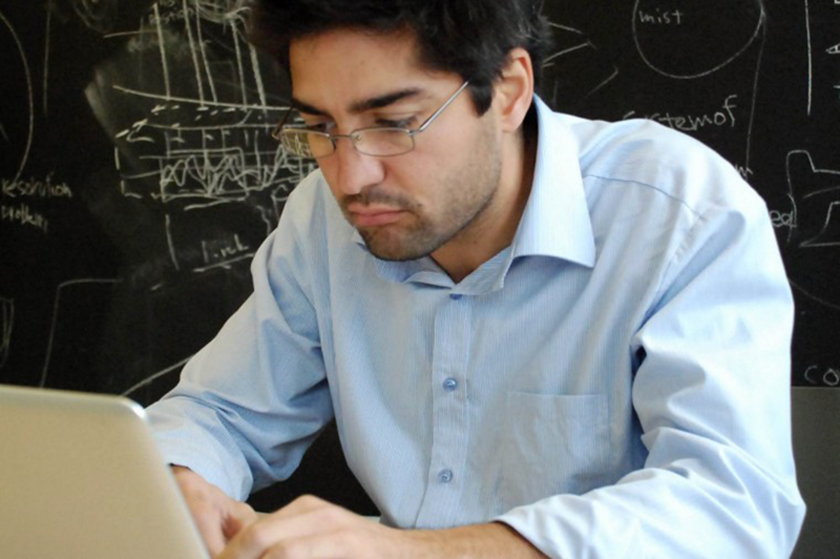

Her forthcoming manuscript, Always More Than One: Individuation’s Dance will be published by Duke University Press in 2012 as will her forthcoming co-written manuscript (with Brian Massumi), Thought in the Act: Passages in the Ecology of Experience (Minnesota UP).
Brian Massumi specializes in the philosophy of experience, art and media theory, and political philosophy.
With Erin Manning of the SenseLab, Concordia University, he co-organizes a series of events and activities under the title “Technologies of Lived Abstraction” dedicated to the collective exploration of new ways of bringing philosophical and artistic practices into collaborative interaction. Also with Erin Manning he edits an MIT Press book series also entitled ”Technologies of Lived Abstraction.” He is the author of:
He is editor of The Politics of Everyday Fear (University of Minnesota Press, 1993) and A Shock to Thought: Expression After Deleuze and Guattari (Routledge, 2002). His translations from the French include Gilles Deleuze and Félix Guattari’s A Thousand Plateaus.